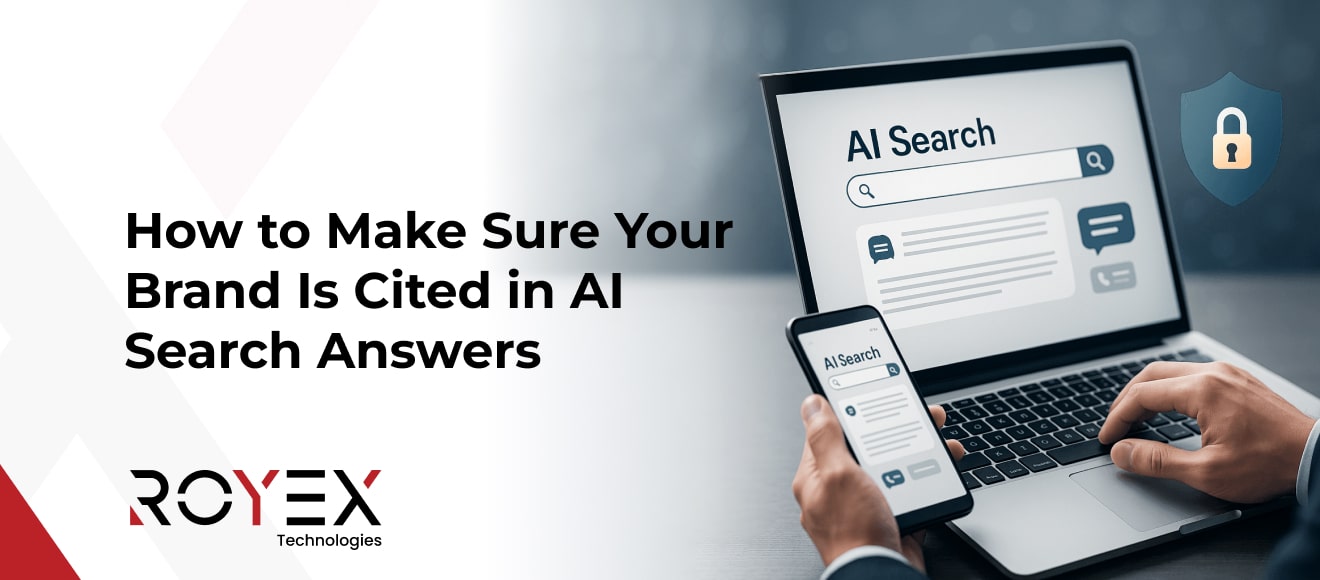
How to Make Sure Your Brand Is Cited in AI Search Answers
Artificial Intelligence (AI) is transforming the way users search for information online. Platforms like ChatGPT, Perplexity, Microsoft Copilot, and Google Gemini are moving beyond traditional search by generating direct answers instead of presenting a list of links.
For businesses, this shift presents a new challenge: traditional SEO strategies may no longer guarantee visibility. To remain competitive, brands must adopt Generative Engine Optimization (GEO) — the practice of ensuring your content is structured, authoritative, and optimized so AI search engines recognize and cite your brand.
This blog post will explore how to get your brand cited in AI-generated answers, covering strategies, best practices, examples, and actionable tips.
1. Understanding How AI Search Engines Work
To optimize your brand for AI search, it’s essential to understand how AI search engines function:
1.1 AI Synthesizes Content
Unlike Google or Bing, which provide lists of links, AI engines generate answers by combining information from multiple sources. They evaluate:
-
Authority of the source
-
Accuracy of information
-
Relevance to the user query
1.2 Why Citing Matters
Being cited in AI answers is not just about visibility — it’s about trust and authority. AI engines prioritize content that is:
-
Well-researched and factual
-
Widely referenced across credible platforms
-
Clearly structured and easy for algorithms to interpret
1.3 The Shift from Keywords to Context
Traditional SEO focused heavily on keywords, backlinks, and ranking positions. AI search prioritizes context, clarity, and expertise. This means:
-
Your brand may appear even if it doesn’t rank #1 in Google search.
-
Providing clear answers to user questions increases the chance of being cited.
Key takeaway: AI engines want content that is accurate, credible, and well-structured — GEO is your strategy to deliver that.
2. Build Authoritative and Well-Structured Content
Creating content that AI engines will cite requires more than just good writing. You need to build authority and clarity.
2.1 Answer Questions Directly
AI loves content that directly addresses user queries. Use FAQ sections or “How-to” guides to make your content easy to reference.
Example:
Instead of writing:
“We build mobile apps.”
Write:
“Royex Technologies develops custom Android and iOS applications with 12+ years of experience, delivering 500+ apps across UAE businesses. We use Flutter and React Native to build scalable, cross-platform apps.”
This gives AI engines a clear, factual, and structured answer that can be cited.
2.2 Use Clear Headings and Subheadings
Structured content helps AI understand:
-
Hierarchy of information
-
Key points to cite
-
Answer mapping for queries
Tip: Use H1 for the main topic, H2 for subtopics, and H3/H4 for detailed points.
2.3 Include Facts, Data, and References
AI engines favor verifiable content:
-
Include statistics, case studies, and reports.
-
Link to credible external sources.
-
Highlight your own credentials or awards.
Example:
“According to Statista 2025, mobile app downloads in the UAE are projected to reach 150 million, creating high demand for quality mobile development.”
2.4 Maintain Consistency Across Channels
-
Your website, blog, and social media should have consistent messaging.
-
Repeated mentions across multiple platforms increase AI’s confidence in your brand authority.
3. Implement Generative Engine Optimization (GEO) Strategies
3.1 Target AI-Friendly Queries
Instead of focusing solely on short-tail keywords, focus on natural language queries:
-
“How can I develop a mobile app in Dubai?”
-
“Best strategies for fleet tracking using AI”
This aligns with how users ask AI assistants questions.
3.2 Structure Content for AI Parsing
AI favors structured and organized content:
-
FAQs
-
Step-by-step guides
-
Lists and tables
Example:
Q: How do I optimize my brand for ChatGPT search?
A: Publish authoritative content, use structured data, and maintain a strong online presence.
3.3 Schema Markup
Use structured data to make your content readable for AI:
-
FAQ schema
-
HowTo schema
-
Product schema
-
Organization schema
Schema helps AI engines identify what your content is about and increases chances of citation.
3.4 Include Consistent Branding
-
Use your brand name naturally in headings, content, and metadata.
-
Mention products, services, or key achievements to signal authority.
Example:
“Royex Technologies, a top mobile app development company in Dubai, has delivered over 500 apps to enterprises and startups.”
4. Leverage Your Expertise and Online Presence
AI engines also consider your digital footprint:
4.1 Publish Across Multiple Platforms
-
LinkedIn, Medium, YouTube, and guest blogs help establish your authority.
-
Consistent mentions signal credibility to AI.
4.2 Use Guest Posts and PR Mentions
-
Getting mentioned on high-authority websites increases the likelihood AI cites your brand.
-
Press releases and industry news articles can be referenced in AI-generated answers.
4.3 Build Topical Authority
-
Focus on a specific niche (e.g., mobile app development in Dubai).
-
Create in-depth guides, case studies, and tutorials.
Example:
A logistics company can publish multiple articles about fleet management and real-time tracking — AI engines will recognize this expertise and cite the brand.
5. Monitor AI Mentions and Optimize Continuously
5.1 Track Where Your Brand Appears
-
Use AI search tools like Perplexity, ChatGPT, or Gemini to see if your brand is being cited.
-
Identify which questions or queries generate mentions of competitors.
5.2 Update and Refresh Content
-
AI engines prioritize fresh and accurate information.
-
Update blogs, case studies, and guides regularly.
5.3 Analyze Gaps and Competitors
-
See where competitors are cited and adapt your content to cover missing questions.
-
Add more detailed answers, examples, or references.
6. Focus on Trust, Accuracy, and Authority
6.1 Provide Verifiable Information
-
AI engines cite sources that can be verified.
-
Include links to statistics, official reports, or whitepapers.
6.2 Highlight Case Studies and Achievements
-
Showcase projects, awards, and client success stories.
-
AI prefers content with demonstrable expertise.
Example:
“Royex Technologies delivered a fleet management solution for a Dubai-based logistics company, reducing delivery delays by 35%.”
6.3 Maintain Transparent Contact Information
-
Include address, phone number, and social profiles.
-
Signals legitimacy to AI engines.
7. Optimize for Voice and Conversational Search
AI-driven answers often come from conversational queries:
7.1 Use Natural Language
-
Write in a friendly, clear, and direct style.
-
Anticipate questions your audience might ask verbally.
7.2 Include Q&A and How-To Sections
-
Organize content as questions with concise, clear answers.
-
AI engines often reference FAQ sections in generated answers.
7.3 Focus on Clarity and Brevity
-
Avoid long, complex sentences.
-
AI prioritizes easy-to-read, accurate answers.
8. Advanced Strategies for AI Citations
8.1 Knowledge Graph Integration
-
Ensure your brand is listed in Google Knowledge Graph and other databases.
-
AI engines often reference entities from these graphs.
8.2 Link Building with High Authority Sources
-
Collaborate with industry publications.
-
Guest posts, interviews, or PR mentions increase your citation likelihood.
8.3 Multimedia Content
-
Use videos, infographics, and charts.
-
AI engines reference structured media for factual content.
8.4 Monitor Emerging AI Platforms
-
Keep track of new platforms like Gemini, Claude, and Bing Chat.
-
Adapt your content strategy to align with evolving AI behavior.
9. Measuring GEO Success
9.1 Metrics to Track
-
Brand mentions in AI answers
-
Traffic from AI-driven sources
-
Engagement on AI-referenced pages
9.2 Tools for Monitoring
-
AI-specific analytics platforms
-
Custom dashboards to track questions, citations, and visibility
-
Google Analytics for AI-driven traffic insights
9.3 Continuous Optimization
-
GEO is ongoing.
-
Regular updates, monitoring, and optimization ensure long-term visibility.
10. Royex Technologies: Your Partner in Generative Engine Optimization
Royex Technologies helps businesses:
-
Optimize content for AI engines like ChatGPT and Perplexity
-
Build authoritative, structured, and well-researched content
-
Monitor citations and adapt strategies for maximum visibility
We are a specialized Generative Engine optimization (GEO) company in Dubai, helping businesses optimize their websites and digital content for AI-powered search engines and intelligent discovery feature
Conclusion
Generative Engine Optimization (GEO) is the future of search visibility. To appear in AI-generated answers, your brand must focus on:
-
High-quality, authoritative content
-
Structured and FAQ-optimized content
-
Strong online presence and cross-platform mentions
-
Continuous monitoring and optimization
By implementing these strategies, your brand can be cited as a trusted source, boosting credibility, visibility, and business growth in the age of AI-driven search.
Ready to get your brand cited in ChatGPT, Perplexity, and AI search engines? Contact Royex Technologies today to implement a comprehensive Generative Engine Optimization strategy and stay ahead in the AI search era.





